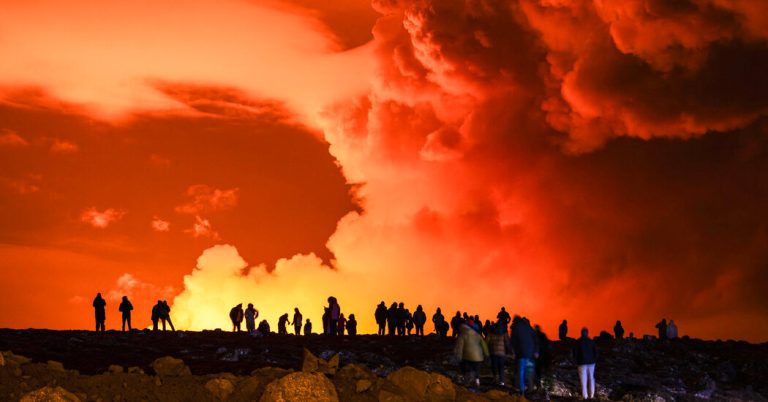The Blue Lagoon resort in the south of Iceland is a picturesque network of steamy blue-green pools surrounded by dark cliffs, where tourists soak in geothermal water, have spa treatments and enjoy what the resort advertises as “a universe of radiant wellness”.
But last week, a stream of glowing lava erupted from a crater a few miles from the resort, forcing the evacuation of hundreds of guests, in yet another eruption of a volcanic system on the Reykjanes peninsula that has been dormant for 800 years.
The eruptions began in 2021, and eruptions and earthquakes on the peninsula have destroyed some houses and forced villagers to flee their homes. A builder has died in the town of Grindavik after falling into a crack caused by an earthquake.
The effects of the volcanic eruptions have spilled beyond the peninsula, disrupting the tourism activities of a country that relies heavily on visitors.
Arnar Már Ólafsson, director general of the Icelandic Tourist Board, said that when a looming volcanic eruption led to the evacuation of Grindavik in November, it caused global anxiety that led to a drop in tourists.
“An erupting volcano doesn’t sound very appealing,” he said.
Icelandair, the country’s national airline, said it had also had a “significant negative impact on bookings” in the final months of 2023. And low-cost Icelandic airline Play said news of the explosion had “chilled demand for Iceland as a destination”.
The tourism board did not release an estimate of the financial losses, and the airlines, while they said they experienced a significant slowdown in sales, did not quantify them.
Airline officials and the director of the tourism board categorically stated in interviews and to national media that the response was unwarranted because the explosions did not pose an immediate threat to visitors or flights. They blamed the media for “alarmism”.
“In the international press, it just looks like Iceland is ruined,” Birgir Jónsson, then Play’s chief executive, said in an interview published in December by a financial magazine.
Tourists used to flock to the Reykjanes peninsula to watch the northern lights or swim in the waters of the Blue Lagoon resort. But since the November earthquakes, the Blue Lagoon had to close for a few days. It said in a statement on Wednesday that it had also been closed from March 16 until at least Thursday and would continue to follow authorities’ safety instructions.
The Northern Light Inn, a family-run hotel, has also had to evacuate guests four times since January and close for weeks, said Fridrik Einarsson, the inn’s owner. Now, they are compensating for the decline in tourists by serving meals to workers building protective walls in the area.
“If this continues for a long time, it will eventually be very, very challenging for us», said Mr. Einarsson.
Mr Ólafsson said any threat to the Blue Lagoon geothermal resort undermined a key component of Iceland’s tourism sector.
“Without the Blue Lagoon, it would be a different destination,” he said, “like Egypt without the pyramids or Paris without the Eiffel Tower.”
The resort is especially popular with visitors from the United States, and each year, hundreds of thousands of people visit the spa, according to the Blue Lagoon website. The spa is now protected by obstacles.
The resort owes its existence to the geothermal energy produced by the volcanic system, which heats its waters. But that same system is also now its main threat.
This paradox, many say, is at the heart of Iceland’s identity as an adventure travel destination where tourists seek unfettered nature in the form of waterfalls, glaciers, hot springs. And 130 volcanoes.
During the volcanic eruptions last year, as tourists flocked to sites where they could see the glowing river of lava, the government had to warn people away from the area as the situation could become dangerous.
Now, Icelandic tourism operators say, stress has eased somewhat and tourism demand has picked up again since January. But for those who remain on the peninsula, there appears to be no immediate end to the disruption to their businesses.
Last week, as Mr. Einarsson, the inn’s owner, evacuated his guests to another hotel because of the volcanic eruption, he said they could see lava from the parking lot.
“It’s a wonderful experience, to see a volcano,” he said.
Mr Einarsson described his relationship with volcanoes as a “difficult love-hate situation”.
On the one hand, he said, “people are justifiably concerned about staying in a hotel next to an explosion site.” On the other hand, he said, people come to Iceland for its nature, and nature wouldn’t be the same without the country’s volcanoes.
“And I wouldn’t be in the business,” he said.
Egil Bjarnason contributed reporting from Gran Canaria, Spain.




